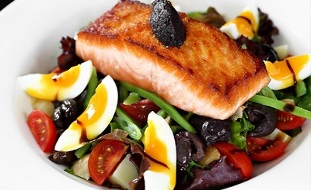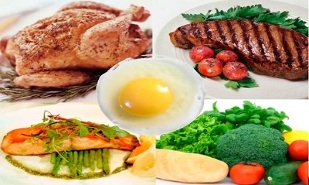How many times have you read a lot of highly effective diets that rid a person of subcutaneous fat? Do you know why there are over 10, 000 weight loss options in the world for different activities? It’s simple: because 90% of them are ineffective. A protein diet is a good option for weight loss, but if used incorrectly it can also be ineffective. How to use proteins for weight loss without harm to health with maximum results?
How to lose weight on a protein diet?
To get rid of subcutaneous fat you need to know the physiological needs of the body, understand when you need to get carbohydrates and when you need to get protein and be able to listen to your body, which provides an unlimited number of requirements if we get the wrong diet.
Of course, most people already know that if you limit your intake of sweet and complex carbohydrates, it is possible to lose significant weight, a specific figure depends on the percentage of fat in the human body. This can be called a low carb diet, which is a very effective way to get rid of fat. The calorie deficit created by minimizing carbohydrate intake is completely filled with fats. This is why people lose weight by limiting the use of carbohydrates in their diet.
What happens if we completely eliminate carbohydrates from our diet?
Are we getting a better way to lose weight? Our Answer: Of course, yes. This diet was especially popular in the golden age of bodybuilding and was widely popularized by Vince Gironde. You just have to look at her photo and you will immediately find out why she advised her. One of the best names for this diet, according to many nutritionists, is the fat burning diet.

Protein Weight Loss Diet is a carbohydrate free diet consisting only of protein foods and fats that are healthy for the body. Carbohydrate calories are fully reimbursed by animal proteins. This approach allows not only to get rid of fat as effectively as possible, but also to speed up metabolism and maintain muscle tissue as much as possible.
Many diets practically do not take into account the last two aspects: their main purpose is simply to reduce daily calorie intake, which does not have a very positive effect on weight loss.
The body believes that a sharp reduction in calorie intake is life-threatening, slows down metabolism and transports food consumed into subcutaneous fat, consuming muscle fibers for energy. To burn the mass. Hope you have already lost the desire to try the famous monodiets?
Basic Principles of Protein Diet
When we create an environment in which there are no carbohydrates at all, ketone bodies begin to secrete subcutaneous fat, which is the main source of energy supply to the brain and nervous system.
To be clear, it is necessary to explain that all the foods we eat contain more or less three foods, and each of them performs its function to maintain the life of the organism. These are fats, proteins and carbohydrates:
- Proteinis a building block for our body because energy is used in extremely rare cases.
- FatStores energy stored during emergencies, fat is also used to protect internal organs.
- Carbohydratesare fully responsible for supplying our body with energy.
Now it is clearer why we want to eat sugary or complex carbohydrates when we are hungry? Because our carbohydrates are the main source of energy and proteins and fats remain in reserve. Therefore, in everyday life, you want to eat exactly the sweet and complex carbohydrates: this is the most efficient way to supply the body with energy. And that's why people do not like to exclude carbohydrate-rich foods from their diet. The body does not understand that man consciously excludes the main source of energy. Your body thinks you are in harsh living conditions and hunger is expected. If carbohydrates do not start flowing in the shortest time, the body will be forced to deplete its extraordinary reserves of fat.
What if you continue to limit your carbohydrate intake?
First, your body will use up all its glycogen stores, which will last for a short time, and only then will it switch to an autonomous diet due to proteins and fats. The protein diet has received a lot of positive reviews from people who have achieved incredible results thanks to this method of weight loss. To be honest, everyone in the diet world has a basis for the protein method of weight loss. Read any mono-diet carefully and you will find the basics in our article between the lines. Naturally, if the author of the diet you are reading has presented it correctly.
It is important to add an important point that leaving about 50 grams of carbohydrates on a rigid protein diet does not cause an increase in human blood glucose. This means that the body continues to eat fatty tissue to maintain a positive energy balance in the body.
Should You Avoid Carbohydrates in Your Protein Diet?
This conclusion has many pluses and one small minus. On the plus side, it eliminates unhealthy carbohydrate intake from the body, causing it to deplete its glycogen stores. And the cause of everything is our old friend insulin. It is its presence or absence that determines what type of energy the body expends. Here everything is simple: the less carbohydrates you eat, the less insulin is released. The surge of this hormone completely blocks the process of lipolysis (breakdown of adipose tissue). It can be concluded that a protein diet eliminates the insulin wave and activates the full effect of lipolysis.
What is the main disadvantage of a protein diet?
In order to maintain the normal functioning of the digestive system, sometimes it is still necessary to get fiber, where? This is true in carbohydrates. Failure to do so can lead to problems such as constipation, which is completely unpleasant news. Therefore, we recommend that you do not exclude vegetables such as cucumbers, tomatoes and cabbage from protein in your diet. They will keep your gastrointestinal tract fully functioning.
Harm of protein diet
Protein diet damage can only happen if you start consuming excessive amounts of protein and completely eliminating fiber from your diet. And all these actions will be used for a long period of time, then the body will start to malfunction. We recommend that you consult your doctor and dietitian before using the above scheme. Because there is an important list of diseases in which only protein foods are not allowed. Good health to everyone and eventually become the owners of the most charming figure in your city.
How long does a protein diet last?

- There is a constant use option in the diet: You only use proteins, healthy fats and fiber for a long time.
- Amplifying dietis only used on exercise days. Carbohydrate loading is done about two hours before exercise to provide glycogen and significantly increase the intensity of exercise. Every other day a protein diet.
- Cyclic use of protein diet. This option provides a load of carbohydrates once a week throughout the day. This will help maintain maximum muscle mass and further boost metabolism. This is the path we recommend for all those who want to make the body worthy of their own soul. Although you can experiment and choose for yourself the most suitable option.
What to eat on a protein diet: food
Perhaps the answer would not surprise you if we say that it must be a food that contains animal proteins. It is best to use lean meats such as veal, beef, chicken breast and rabbit. From dairy products, choose foods that do not contain large amounts of fat, but should not eat only low-fat kefir. A fat content of up to 10% is quite suitable. This is normal, no need to worry. "Remember, fats burn on the fire of carbohydrates. "Be sure to eat fish: it not only contains protein but is also a source of healthy omega fats. Do not forget about eggs as a sign of assimilation among all the products listed above.
should be 5 to 10 meals a day, in fact, the better. That is why all food should be prepared in the morning and evenly distributed in the cups: this allows you to open the dishes with food at any time of the day and consume the required amount of food.
Sample Menu of the Week
This is what a 7-day protein diet menu might look like, or it could be extended to 14 days.
Monday
- packaging of low-fat cottage cheese;
- can of yogurt, 1 grapefruit;
- 2 chicken breasts, broccoli, half a cup of kefir;
- can of yogurt, grated medium carrots;
- 1 liter of mineral water, one glass of natural apple juice.
Tuesday
- yogurt, green apples;
- 100 g any meat, cheese, tomatoes, 1 Bulgarian pepper;
- 200 g fish, celery salad, carrots and ½ apples;
- 2 boiled eggs, cabbage salad with parsley and lemon juice;
- 1 liter of water, 1 glass of currant juice.
Wednesday
- yogurt, one cup of strawberries;
- whole grain cottage cheese, spoon chopped parsley, red pepper and tomato paste;
- 2 chicken breasts, a cup of spinach, half a cup of kefir;
- any pot, zucchini, 1 tomato, 2 tablespoons dill (you can mix vegetables and add 2 tablespoons of olive oil), 2 slices of ham;
- 1 liter of water, one glass of orange juice.
Thursday
- packaging of low-fat cottage cheese;
- a cup of kefir, ½ a cup of raspberries;
- 200 g boiled, 1/3 cup milk, carrots;
- 2 eggs, cabbage salad with paprika and parsley, seasoning with lemon juice;
- 1 p. Water, a glass of currant juice.
Friday
- Yogurt, 2 tangerines;
- grain cottage cheese (1 pack);
- 200 g of sea fish, tomato, red pepper and parsley salad, yogurt;
- whole grain cottage cheese (1 pack), carrots, green apples;
- 1 liter of water, one glass of orange juice.
Saturday
- 100 g cottage cheese, skim milk;
- a glass of kefir;
- 2 chicken breasts, beans, yogurt;
- ham Ham, broccoli, 1 egg, 2 tablespoons corn;
- 1 p. Water, a glass of currant juice.
Sunday
- a cup of kefir, ½ a cup of raspberries (or other berries);
- grain cottage cheese, ham slice;
- Stewed chicken liver, lettuce with lemon juice, apples;
- yogurt with added fruit;
- 1 liter of water, one glass of apple juice.














































































